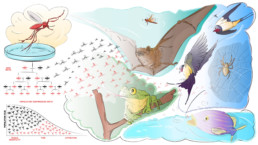European Parliament calls for ban on gene drive technology
Report on the EU‘ Biodiversity Strategy for 2030: Precaution prevails
9.06.2021, Berlin –The European Parliament yesterday confirmed it‘s precautionary stance towards the use of a new genetic engineering technology called gene drive.[i] In it´s report on the EU’s Biodiversity Strategy for 2030, adopted at the European Parliament’s plenary on 08.06.2021, Parliamentarians demand that „no releases of genetically engineered gene drive organisms should be allowed, including for nature conservation purposes, in line with the precautionary principle.“
Mareike Imken, coordinator of the European Stop Gene Drive Campaign welcomes this decision and comments:„With its position today, the European Parliament recognizes that this technology raises a series of scientific, regulatory, societal and ethical questions and concerns. As its use could severely harm biodiversity, the European Parliament calls to postpone any environmental releases until these questions have been addressed and settled. This is an important message that should feed into the ongoing discussions about global regulations at the next meeting of the International Union for Conservation of Nature (IUCN) in September in Marseille and those of the Convention on Biological Diversity in October in Kunming, China.“
27civil society and science organizations from across the EU had sent a letter to Parliamentarians in support of the amendment ahead of the vote. It „provides reasonable suggestions on how to implement the European Parliament’s previous position in its resolution on the 15th meeting of the Conference of Parties (COP15) to the Convention on Biological Diversity (2019/2824(RSP)“.
In that previous position, adopted in January 2020, the European Parliament had called “on the Commission and the Member States to call for a global moratorium at the COP15 on releases of gene drive organisms into nature, including field trials, in order to prevent these new technologies from being released prematurely and to uphold the precautionary principle, which is enshrined in the Treaty on the Functioning of the European Union as well as the CBD“.
Background information:
Text adopted in the report on the EU Biodiversity Strategy for 2030: Bringing nature back into our lives (2020/2273(INI)):[ii]
The European Parliament,
148. “Is concerned about the new legal, environmental, biosafety and governance challenges that might arise from the release of genetically engineered gene drive organisms into the environment, including for nature conservation purposes; acknowledges the outcome of the Ad Hoc Technical Expert Group of the Convention on Biological Diversity on gene drives and living modified fish, which raises concerns about the difficulties of predicting their behavior, assessing their risks and controlling them after release; notes that gene drive organisms could become invasive species in themselves; considers that global and EU–level risk assessment guidance materials, tools and an environmental monitoring framework, as well as clear global governance and effective mechanisms for controlling and reversing the effects of gene drive organisms, should be fully developed, and that additional research is required on the health, environmental, ecological, ethical and other implications of gene drive organisms to better understand their potential impact; considers therefore that no releases of genetically engineered gene drive organisms should be allowed, including for nature conservation purposes, in line with the precautionary principle ; “.
—————
Download the press release here.
Letter to MEPs by civil society organisations prior to the vote.
[i] Voting results and margins for EU Biodiversity Strategy
[ii] Report on the EU Biodiversity Strategy for 2030: Bringing nature back into our lives

